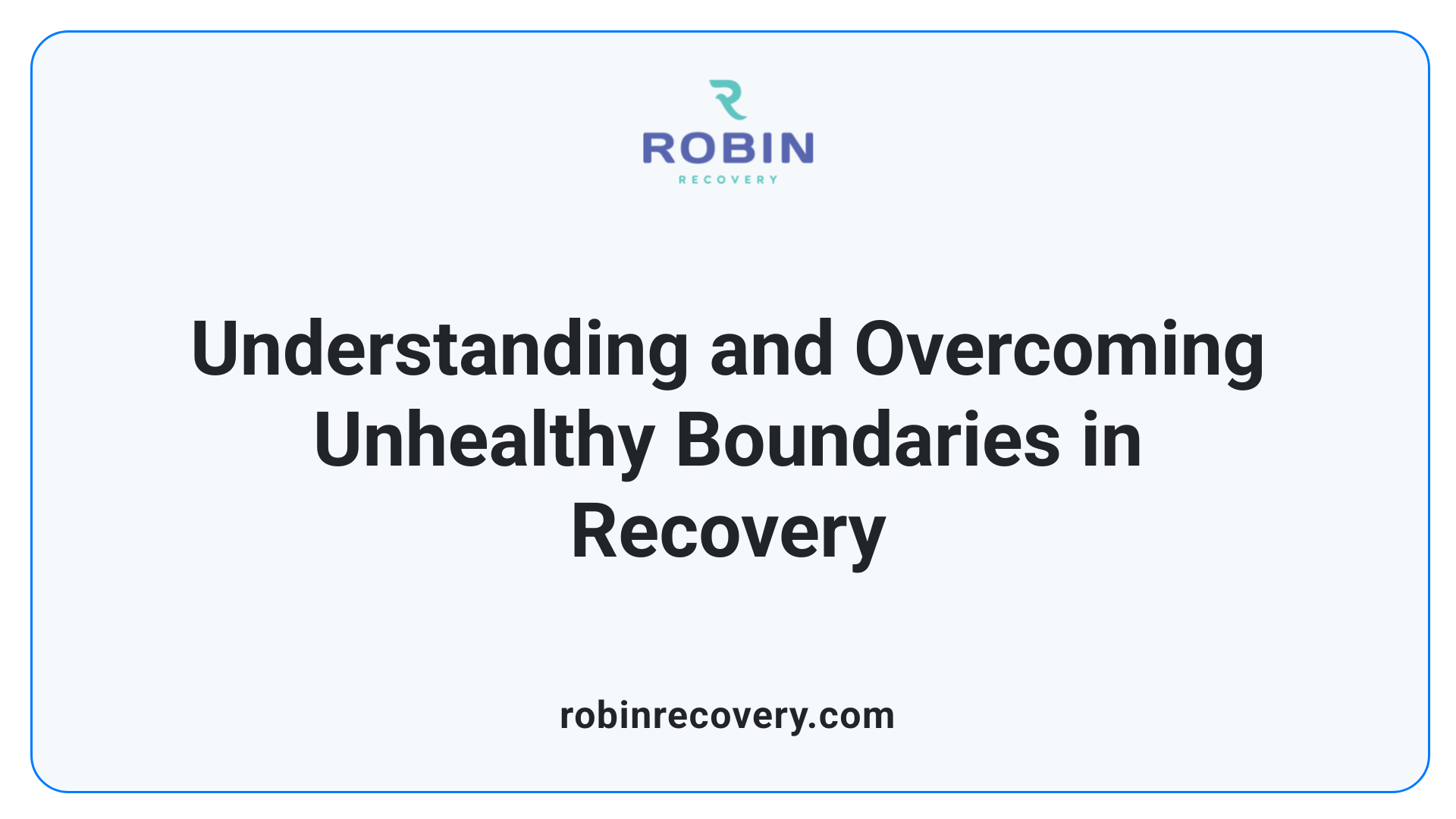The Importance of Boundaries in Recovery Relationships

Understanding Boundaries in Recovery
In addiction recovery, setting healthy boundaries is a fundamental practice that aids individuals in navigating their journey toward sobriety. Boundaries support personal well-being by defining what is acceptable and safeguarding against emotional and physical harm. This article delves into the importance of establishing boundaries, exploring their types, significance, and strategies for effective implementation in recovery relationships.
The Significance of Setting Boundaries in Recovery

Why are boundaries important in recovery?
Boundaries are important in recovery because they help individuals define their identity and ensure relationships are safe and supportive. They safeguard emotional and physical well-being, particularly in toxic environments that could trigger relapse. Here are a few crucial aspects of boundaries in recovery:
- Defining Personal Identity: Establishing boundaries allows recovering individuals to articulate their needs and maintain their values.
- Preventing Relapse Triggers: By setting limits around interactions and situations, individuals can effectively manage triggers that could lead to substance use.
- Promoting Self-Care: Boundaries contribute to personal well-being. They encourage self-discipline and the recognition of personal limits, essential for maintaining a healthy recovery.
Setting both external and internal boundaries not only supports emotional stability but also assists in rebuilding self-esteem and fostering self-love. These boundaries empower individuals to navigate social situations more confidently, protecting their recovery journey.
Protecting against relapse triggers
Establishing boundaries serves as a protective barrier against relapse. By identifying what situations or individuals pose a risk, recovering individuals can avoid environments that may tempt them to revert to old habits. For instance:
- Avoiding Toxic Relationships: Distance from people or relationships that encourage unhealthy behaviors.
- Managing Social Situations: Opting out of gatherings that involve drugs or alcohol, thereby reinforcing commitments to sobriety.
Maintaining this level of awareness helps build resilience, essential for long-term recovery success.
Emotional and physical well-being
Healthy boundaries create an environment conducive to emotional healing and physical care. They facilitate positive interactions and allow for constructive communication with loved ones. Examples of boundaries that contribute to well-being include:
- Emotional Boundaries: Protecting personal feelings and expressing them clearly without oversharing.
- Physical Boundaries: Maintaining personal space and safety, especially in potentially triggering situations.
Overall, embracing boundaries establishes a foundation for healthier relationships while safeguarding recovery progress.
Types of Boundaries: A Comprehensive Look
Different Types of Boundaries
Boundaries can be classified into two primary categories: external boundaries and internal boundaries. External boundaries focus on how individuals interact with others, while internal boundaries are about self-regulation and personal discipline. Within these frameworks, five significant types of external boundaries aid in fostering healthy relationships:
- Physical Boundaries: Define personal space and safety.
- Mental Boundaries: Involve control over thoughts and the information shared with others.
- Material Boundaries: Address ownership and privacy concerning personal possessions.
- Emotional Boundaries: Center on the responsibility individuals have for their feelings.
- Spiritual Boundaries: Concern the protection of personal beliefs.
Role in Addiction Recovery
Setting boundaries is crucial for individuals in addiction recovery. It serves as a protective measure that enhances self-respect and emotional health. By clearly defining limits, individuals can safeguard against triggers and potentially harmful situations that may lead to relapse. Healthy boundaries help to cultivate a supportive environment and promote resilience, especially for those emerging from codependent or toxic relationships. As people learn to establish and maintain these boundaries, they also gain a greater understanding of their personal needs and values, which is integral to their recovery journey.
Examples in Practical Settings
In practical terms, examples of healthy boundaries in addiction recovery include:
- Physical Boundaries: Removing alcohol from one’s home or informing others not to engage with personal recovery items, like journals.
- Emotional Boundaries: Deciding when to limit emotional sharing, particularly with individuals who may not respect those feelings.
- Time Boundaries: Dedicate time for recovery activities while avoiding overcommitment to others’ demands.
- Internal Boundaries: Commit to actions aligned with personal values, such as avoiding certain triggers.
By implementing these boundaries, individuals not only protect their recovery but also foster healthier interpersonal relationships.
Addressing Unhealthy Boundaries and Their Challenges

How do unhealthy boundaries manifest in recovery, and why are they problematic?
Unhealthy boundaries often show up in recovery through controlling behaviors, manipulation, and emotional dependency. Relationships may involve one person excessively trying to influence the other's decisions or emotions, often introducing stress and frustration.
Such dynamics can jeopardize a person’s well-being and recovery efforts by undermining trust and open communication. Signs of unhealthy interactions may include hostility, blame, or emotional abuse, which can lead to toxic codependency—where individuals feel unduly responsible for each other's feelings and actions.
Deciding whether to remain in or exit these relationships poses a significant challenge, often accompanied by fears of relapse or feelings of loneliness. For example, one might hesitate to cut ties with a friend who is not supportive, worrying about missing social connections, even when those connections may facilitate harmful behavior.
To promote recovery, it is critical to foster healthy boundaries that encourage mutual respect and open dialogue. Establishing clear and assertive boundaries not only protects self-esteem but also enhances the potential for positive, supportive relationships that are essential during the recovery journey.
Boundaries as a Tool for Personal Growth
How can boundaries enhance personal growth during recovery?
Boundaries play a crucial role in fostering personal growth during addiction recovery. By establishing these limits, individuals create a secure environment in which they can recognize and respect their own needs and limits. This understanding is vital for developing a healthy sense of self, particularly after experiencing the chaos that often accompanies addiction.
Setting boundaries helps define personal values, such as prioritizing sobriety, which protects individuals from exposure to potential relapse triggers. By clearly articulating these values, individuals carve out a space for emotional growth and self-care.
Here are a few specific ways boundaries contribute to personal development in recovery:
- Enhancing Emotional Well-Being: By defining emotional boundaries, individuals can separate their feelings from others, fostering healthier relationships and reducing emotional exhaustion.
- Promoting Supportive Relationships: Boundaries encourage the formation of relationships that are based on mutual respect, allowing recovering individuals to surround themselves with positive influence instead of toxic environments.
- Building Self-Awareness: Regularly checking in with personal boundaries empowers individuals to better navigate their recovery process, nurturing accountability and honesty in their emotional landscape.
Ultimately, the discipline of maintaining healthy boundaries fosters resilience, bolsters self-esteem, and reinforces each individual's commitment to their recovery efforts.
Strategies for Effective Boundary Setting

Steps for Implementing Boundaries
Establishing boundaries in recovery is critical for fostering healing and regaining control. Here are some actionable steps:
- Identify Personal Limits: Reflect on your needs and triggers. What situations or interactions feel uncomfortable or unsafe?
- Define Clear Boundaries: Write down specific boundaries that you want to implement, such as avoiding places associated with substance use or limiting interactions with certain individuals.
- Start Small: Begin with less challenging boundaries to build your assertiveness before tackling more complex issues.
Communication Techniques
Effective communication is essential when establishing boundaries. Use these techniques for clarity and respect:
- Utilize "I" Statements: For example, express your discomfort by saying, "I feel overwhelmed when discussions about alcohol come up during family gatherings."
- Be Direct: Clearly state your needs without leaving room for misinterpretation. Keep messages straightforward to avoid confusion.
- Practice Consistency: Consistently uphold your boundaries to reinforce their importance. If a boundary is crossed, reiterate it calmly and firmly.
Support Systems
Creating a network of support can enhance your boundary-setting process:
- Engage Trusted Individuals: Share your boundary goals with friends, family, or recovery groups for accountability and encouragement.
- Seek Professional Help: Therapists can provide insights and strategies tailored to your specific needs, ideal for navigating complex emotions associated with boundary setting.
- Participate in Supportive Communities: Connecting with others in recovery can offer shared experiences and strengthen the motivation to maintain healthy boundaries.
Setting healthy boundaries nurtures personal growth and is instrumental in maintaining sobriety, helping individuals prioritize both their recovery and emotional health.
Navigating Boundaries in Complex Relationships

Boundaries in Codependent Relationships
Codependent relationships often blur individual identity and responsibilities. For those in recovery, setting clear boundaries can help restore a sense of self, separating personal feelings from those of others. Practicing internal boundaries, such as recognizing when to say no, is essential. This empowers individuals to prioritize their own needs and fosters healthier dynamics.
Effects of Toxic Environments
Toxic environments can impede recovery, making boundary setting vital. Healthy boundaries create a protective buffer against negative influences, safeguarding emotional well-being. Recognizing the signs of a toxic environment—like feeling overwhelmed—can prompt individuals to distance themselves or communicate their limits effectively.
Handling Familial Relationships
Familial relationships can be particularly challenging during recovery. Communication is crucial; expressing discomfort with certain behaviors, such as drinking in family gatherings, helps create a supportive atmosphere. By defining emotional and physical boundaries with family members, individuals can protect their sobriety while rebuilding trust and understanding in these essential relationships.
Building a Foundation of Respect and Trust

Rebuilding trust through boundaries
Healthy boundaries play a pivotal role in rebuilding trust after addiction. They define personal responsibilities and ensure that each person in a relationship understands their role. This respect sets a strong foundation for interactions, fostering an environment where individuals can openly communicate their needs and feelings. When boundaries are communicated clearly, it not only strengthens personal autonomy but also reassures loved ones about the recovering individual's commitment to their journey.
Establishing respectful communication
Effective communication is essential to maintain boundaries. Using "I" statements can help express feelings without provoking defensiveness. For example, stating, "I feel uncomfortable when alcohol is served at gatherings," invites a conversation about needs while respecting others' feelings. This straightforward approach minimizes misunderstandings and encourages others to acknowledge and respect personal limits.
Preventing relapse
Establishing boundaries is a significant preventive measure against relapse. They function as guidelines to protect against triggers that may lead back to substance use. For instance, distancing oneself from toxic environments or harmful relationships can help maintain sobriety. By asserting these boundaries, individuals prioritize their recovery, making self-care an integral part of their lifestyle during and after treatment.
Conclusion: Empowerment Through Boundaries
Setting and maintaining healthy boundaries are empowering steps in the recovery journey. They provide the structure needed for individuals to reclaim their lives and foster environments conducive to healing and growth. By understanding and implementing these vital tools, individuals can protect their sobriety while opening the path to lasting personal development and enriched relationships.
References
- Why Healthy Boundaries Are So Important in Recovery
- Boundaries in Addiction Recovery - Hazelden Betty Ford
- The Importance of Healthy Boundaries in Addiction Recovery
- What do healthy boundaries look like in recovery? - MHA Screening
- Why is Setting Boundaries in Addiction Recovery So Important
- 4 Types of Boundaries in Recovery - Bradford Health Services
- The Importance of Setting Boundaries in Recovery - Bold Health
